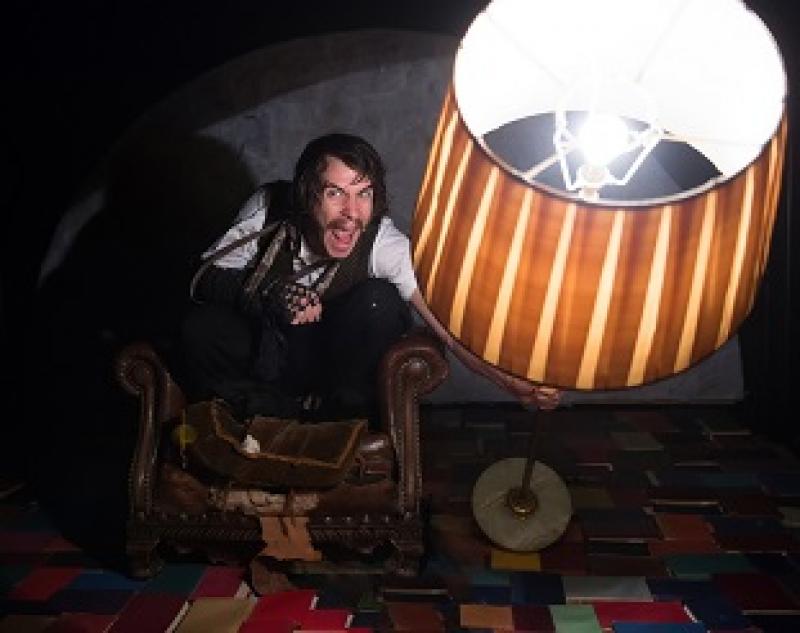Notes from Underground, Print Room | reviews, news & interviews
Notes from Underground, Print Room
Notes from Underground, Print Room
Harry Lloyd frantically engaged with one of Dostoevsky's less sympathetic characters

“I am spiteful! I am ill! You are not going to like this!” With these words Harry Lloyd opens his one-man show that adapts the Dostoevsky 1864 novella that is often hailed as the first work of literary existentialism. Lloyd is already on stage as the audience enter, darkly bearded, sitting in a dishevelled armchair on a floor created from stacked books beneath his bare feet, his haunted piercing eyes following viewers as they take their seats.
He can’t wait to talk. Lloyd duly launches into a 70-minute diatribe that reveals the darker corners of the soul of an uneasy, unreliable narrator. The actor may be best known for his television work, including Viserys Targaryen from the first series of Game of Thrones, but he’s gripped and fascinated here by the sheer theatricality of his character, who delights in his humiliations in a way that’s borderline masochistic.
Lloyd gives a four-star performance of a script that sometimes does not quite rise to that
The question is whether he can engage the audience in the same way as they settle in with someone who is clearly most used to talking to himself (Lloyd the hectorer, pictured below right). As someone you would not want to be stuck in a train compartment with the Underground Man, as we know him, probably ranks up there with Coleridge’s Ancient Mariner. (Interestingly, Lloyd’s monologue refers to insects on a couple of occasions, putting us in mind of the absurdist heroes of Franz Kafka, and in formal terms of adapting prose for the stage particularly of his story “A Report to an Academy”, seen a few years back at the Young Vic.) How much can the tone be varied away from the purely manic, into moments of quieter introspection? Quite how much the comic interaction will come through – maybe not something you expect with this material, but it’s certainly there – will likely depend on the audience at each performance.
Maybe Lloyd could go just a little further in bringing out such contrasts, but perhaps they will come as this four-week run develops (playing the piece twice a night is going to test his physical stamina too). But it’s a struggle to find empathy with a character whose interactions with human beings are so limited, and presented with an almost perverse delight in that very limitation. The closing episode relates his encounter with the prostitute Liza, with whom the Underground Man does establish a moment of real contact – he’s almost disgusted with himself for having done so – before intentionally shattering the possibility of any such shared emotion.
 The scene preceding that, where he encounters old school friends and invites himself to a reunion dinner, before revelling in their perceived rejection of him has even less potential for positive engagement. In that episode, on another note, it seems a strange decision by Lloyd and his director and co-adapter Gerald Garutti to bring the piece into an English context. In Dostoevsky’s story the friends and their unwelcome guest have gathered to bid farewell to one Zernov, who’s being sent away from St Petersburg to the Russian provinces, while Lloyd’s character goes along to fete a certain Briggstock, who’s off to Hong Kong of all places. It gives a very strange Home Counties note to a work that, as with most Dostoevsky, seems to breathe the dank air and inhabit the short winter days of Russia’s Northern Capital.
The scene preceding that, where he encounters old school friends and invites himself to a reunion dinner, before revelling in their perceived rejection of him has even less potential for positive engagement. In that episode, on another note, it seems a strange decision by Lloyd and his director and co-adapter Gerald Garutti to bring the piece into an English context. In Dostoevsky’s story the friends and their unwelcome guest have gathered to bid farewell to one Zernov, who’s being sent away from St Petersburg to the Russian provinces, while Lloyd’s character goes along to fete a certain Briggstock, who’s off to Hong Kong of all places. It gives a very strange Home Counties note to a work that, as with most Dostoevsky, seems to breathe the dank air and inhabit the short winter days of Russia’s Northern Capital.
Lloyd gives a four-star performance of a script that sometimes does not quite rise to that. Notes from Underground reaches London from Paris, and has found itself a very nice gaff (a word that catches well the spirit of the downtrodden room in which it’s set) indeed at the Print Room’s new home at Notting Hill Gate’s Coronet cinema. What used to be the smaller hall there has been transformed into a great 100-seater, black-box style space (in its cinema days the space seemed long and narrow, but it’s been adapted into something much roomier). The Print Room’s previous venue was under landlord threat, and the full project of adapting the rest of the Coronet is going to take considerable time and much funding, but first impressions of this new space are excellent. When it's all eventually finished West London will have a new cultural centre, housed in the elegant building that opened as a theatre in 1898. Apparently John Gielgud saw his first Shakespeare there in 1912. Harry Lloyd is only the latest player in a long stage history.
rating
Share this article
The future of Arts Journalism
You can stop theartsdesk.com closing!
We urgently need financing to survive. Our fundraising drive has thus far raised £49,000 but we need to reach £100,000 or we will be forced to close. Please contribute here: https://gofund.me/c3f6033d
And if you can forward this information to anyone who might assist, we’d be grateful.

Subscribe to theartsdesk.com
Thank you for continuing to read our work on theartsdesk.com. For unlimited access to every article in its entirety, including our archive of more than 15,000 pieces, we're asking for £5 per month or £40 per year. We feel it's a very good deal, and hope you do too.
To take a subscription now simply click here.
And if you're looking for that extra gift for a friend or family member, why not treat them to a theartsdesk.com gift subscription?
more Theatre
 Ragdoll, Jermyn Street Theatre review - compelling and emotionally truthful
Katherine Moar returns with a Patty Hearst-inspired follow up to her debut hit 'Farm Hall'
Ragdoll, Jermyn Street Theatre review - compelling and emotionally truthful
Katherine Moar returns with a Patty Hearst-inspired follow up to her debut hit 'Farm Hall'
 Troilus and Cressida, Globe Theatre review - a 'problem play' with added problems
Raucous and carnivalesque, but also ugly and incomprehensible
Troilus and Cressida, Globe Theatre review - a 'problem play' with added problems
Raucous and carnivalesque, but also ugly and incomprehensible
 Clarkston, Trafalgar Theatre review - two lads on a road to nowhere
Netflix star, Joe Locke, is the selling point of a production that needs one
Clarkston, Trafalgar Theatre review - two lads on a road to nowhere
Netflix star, Joe Locke, is the selling point of a production that needs one
 Ghost Stories, Peacock Theatre review - spirited staging but short on scares
Impressive spectacle saves an ageing show in an unsuitable venue
Ghost Stories, Peacock Theatre review - spirited staging but short on scares
Impressive spectacle saves an ageing show in an unsuitable venue
 Hamlet, National Theatre review - turning tragedy to comedy is no joke
Hiran Abeyeskera’s childlike prince falls flat in a mixed production
Hamlet, National Theatre review - turning tragedy to comedy is no joke
Hiran Abeyeskera’s childlike prince falls flat in a mixed production
 Rohtko, Barbican review - postmodern meditation on fake and authentic art is less than the sum of its parts
Łukasz Twarkowski's production dazzles without illuminating
Rohtko, Barbican review - postmodern meditation on fake and authentic art is less than the sum of its parts
Łukasz Twarkowski's production dazzles without illuminating
 Lee, Park Theatre review - Lee Krasner looks back on her life as an artist
Informative and interesting, the play's format limits its potential
Lee, Park Theatre review - Lee Krasner looks back on her life as an artist
Informative and interesting, the play's format limits its potential
 Measure for Measure, RSC, Stratford review - 'problem play' has no problem with relevance
Shakespeare, in this adaptation, is at his most perceptive
Measure for Measure, RSC, Stratford review - 'problem play' has no problem with relevance
Shakespeare, in this adaptation, is at his most perceptive
 The Importance of Being Earnest, Noël Coward Theatre review - dazzling and delightful queer fest
West End transfer of National Theatre hit stars Stephen Fry and Olly Alexander
The Importance of Being Earnest, Noël Coward Theatre review - dazzling and delightful queer fest
West End transfer of National Theatre hit stars Stephen Fry and Olly Alexander
 Get Down Tonight, Charing Cross Theatre review - glitz and hits from the 70s
If you love the songs of KC and the Sunshine Band, Please Do Go!
Get Down Tonight, Charing Cross Theatre review - glitz and hits from the 70s
If you love the songs of KC and the Sunshine Band, Please Do Go!
 Punch, Apollo Theatre review - powerful play about the strength of redemption
James Graham's play transfixes the audience at every stage
Punch, Apollo Theatre review - powerful play about the strength of redemption
James Graham's play transfixes the audience at every stage
 The Billionaire Inside Your Head, Hampstead Theatre review - a map of a man with OCD
Will Lord's promising debut burdens a fine cast with too much dialogue
The Billionaire Inside Your Head, Hampstead Theatre review - a map of a man with OCD
Will Lord's promising debut burdens a fine cast with too much dialogue

Add comment